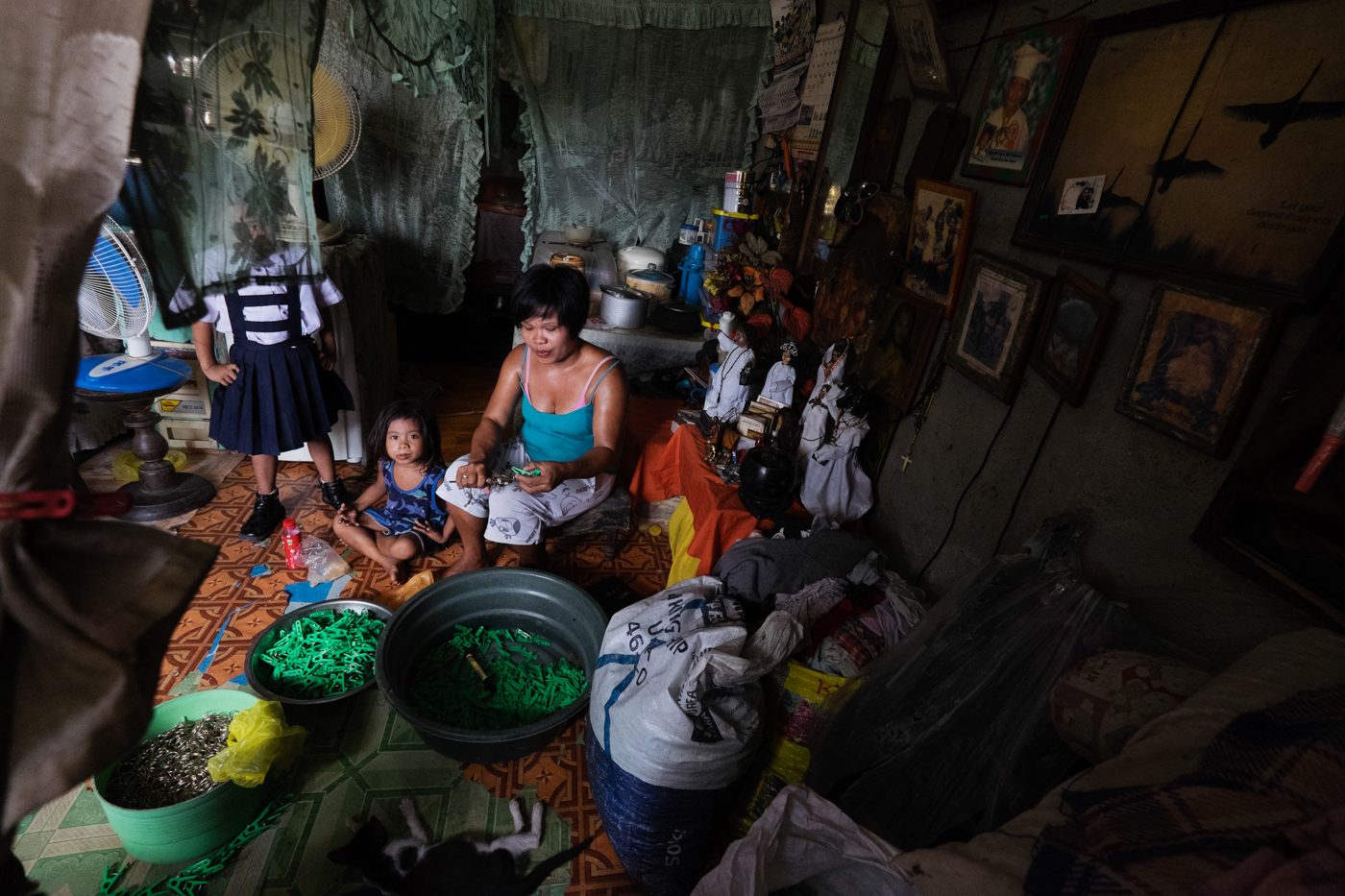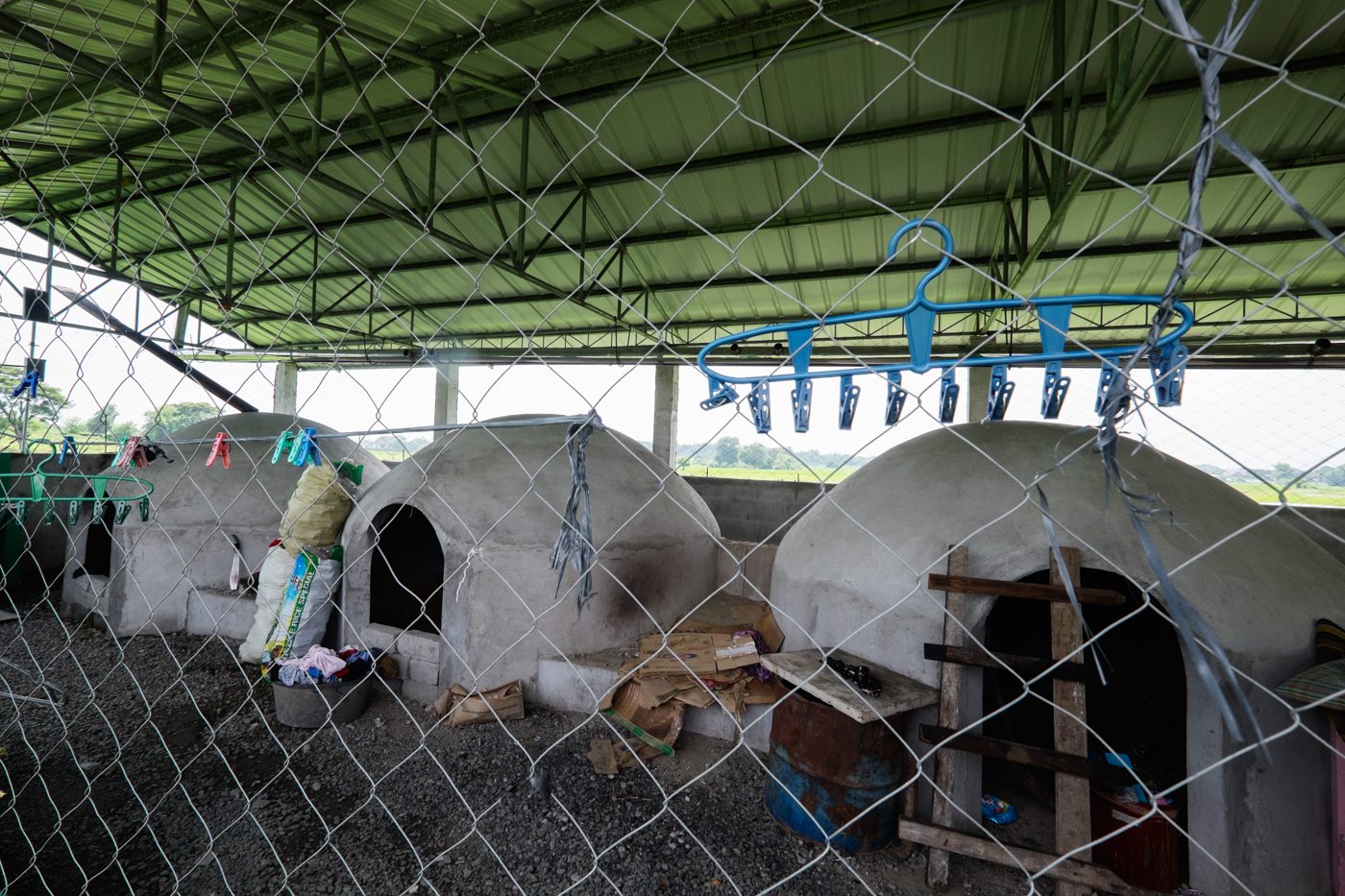SUMMARY
This is AI generated summarization, which may have errors. For context, always refer to the full article.

BULACAN, Philippines—On most days, the village is silent. Inside some of the houses, there is the sound of metal rings being clipped against plastic. Click, click, each click brings them closer to another peso to be earned. It continues all day, the rhythm beating faster in the afternoon, when the children are dismissed from school and start making clothespins with their mothers.
Click, click, click.
The hundredth or two hundredth click sounds like two one-peso coins hitting each other, and the weight of a sack of clips can feel as heavy as a P50 (US$1.07) paper bill or as light as a few pieces of bread that will feed their family for a week.
For more than a year, the clothespin makers of Bocaue, Bulacan, have been earning a meager P2 (US$0.04) per kilo. Most of them receive less than P200 (US$4.29) from producing 3 to 5 sacks per week.
They claim that a truck from Northville, Bulacan, passes the community weekly, collecting clothespins and dropping off raw materials to be made into another bag of clips. They do not know exactly where the pins go, who sells them, or for how much.
“[Yung kinikita namin] parang pang-merienda lang, pangbayad sa utang namin (The money we earn is only enough for snacks, for paying our dues),” says Marilou, a grandmother and a mother of 4 who seldom leaves her house so she could produce more clips.
One weekday afternoon, Rappler chanced upon Jonathan Pingol, an 11-year-old in first grade, working at home. He has been sick with bronchopneumonia since he was 7 and couldn’t go to class that day, but he was still making clothespins, arranging them in a straight line on his makeshift table. He has little time to play on the streets after school because he usually helps his sister make pins from the moment he gets home until he goes to bed.
Relocation
Before Jonathan and the other residents started producing clothespins in Bocaue, they were either scavenging for food in Aroma, Tondo, or making charcoal in Ulingan. The living conditions in Ulingan have caused a number of problems for its residents, including malnutrition, physical hazards, asthma, and pneumonia. In 2014, the government demolished the houses in the area.
According to Melissa Villa, founder of Project PEARLS (Peace, Education, Aspiration, Respect, Love, Smiles), a non-profit organization that has been supporting the Ulingan community since 2010, the residents were transferred to a relocation site built by the National Housing Authority in Bocaue.

When they were resettled, the Department of Social Welfare and Development (DSWD) gave them “family packs,” consisting of food good for a week.
“Meron nag-request [na magpa-lipat], meron din hindi, kasi syempre dun sila nakakakuha ng hanap buhay (Some of them requested to be transferred while some did not want to be relocated because their livelihood was there),” said Christian Cadiang, the field project development officer from DSWD.
Some were also paid in different amounts just to leave Ulingan. Marilou was given P40,000 (US$858.49), which she used to buy the small house she currently lives in, while Jonathan’s family received P3,000 (US$64.39).
The families who do not own the houses in Bocaue are charged P200-P1,000 per month (US$4.29-US$21.46).
Life and livelihood in Bocaue
The residents are satisfied with the living conditions in Bocaue, citing safety, cleanliness, and indoor plumbing as some of the reasons. However, their biggest problem is still the lack of sufficient livelihood.
“The government just provided them with housing. Walang (No) livelihood projects, so wala silang (they have no) source of income,” explained Villa.
Marilou, who now earns less than P200 (US$4.29) in two weeks, used to earn P2,000 (US$42.92) weekly from producing charcoal in Ulingan. According to Maryjane, their earnings were more than enough there.
“Mas malaki doon, sawa pa kami sa pagkain (We earn more there and have more than enough to eat),” said Marilou.
A small area in the community was turned into a smokeless furnace where they could produce charcoal, but the site was closed.
To add to their sparse earnings, a lot of their husbands stay in Manila. They work as carpenters, delivery boys, and dishwashers. Some have gone back to scavenging in Tondo. They visit their families in Bulacan once a week while their wives toil for various sources of income in Bocaue.

Aside from making clothespins, some of them have sidelines. Jonathan’s mother works at Project PEARLS’ daycare where she earns P200 (US$4.29) a day while Maryjane believes she is a faith healer. Although she does not charge for her services, people giver her P5-P10 (US$0.11-US$0.22) for her prayers. But it is still not enough.
Relocation problems
Because of insufficient funds, they have very little to eat. Marilou’s family seldom gets to eat meat while the Pingol family makes do with whatever its members have for the day.
“Nung nandun kami sa Ulingan, wala pong sakit yung mga anak ko. Dito lang kami nagkasakit dahil sa…pagkain (We didn’t get sick when we were living in Ulingan. We got sick here because of the lack of food),” said Maryjane, whose child Mary Joy, was born with a heart disease. She died at two months, after being frightened by a ball.
Jonathan Pingol has been sick with bronchopneumonia for 4 years, and his family is worried about the hospital bills.
The lack of sufficient livelihood and health problems due to hunger are not the only problems in relocation sites lke Bocaue. Karina Constantino-David, in M. Rajaretnam’s book Trends in the Philippines II, explains that a lot of resettlement areas lack basic necessities. They are also far from the city where there are more opportunities for employment. Costs of commuting add to the burden of daily life.
As a result, families are either displaced because one parents has to seek work in the city, or families end up going back to Manila. Because of this, more than half of the residents living in the 4 major resettlement areas of the government were forced to return to the city for work.
“‘Pag may puhunan po talaga ako, pipiliin ko ang lugar na ito. ‘Pag wala talaga akong puhunan, wala pong choice po, babalik sa Tondo para mangalakal,” confessed Maryjane, who had to send her parents back to Surigao, their province, after they were relocated because she could no longer support them.
(If I had enough money here, I would stay here. But if I don’t, I have no choice but to go back to Tondo to scavenge.)

Preferred livelihood
The clothespin makers of Bocaue still long for better jobs. Marilou hopes for a factory to be built in the area so it could provide more job opportunities while Maryjane wants to save enough money to start a sari-sari store.
Jonathan wants to become a policeman one day and Marilou’s children dream of becoming doctors. But for now, even though the clothespins provide them with barely enough, they are what hold the families together. – Rappler.com
Add a comment
How does this make you feel?
There are no comments yet. Add your comment to start the conversation.